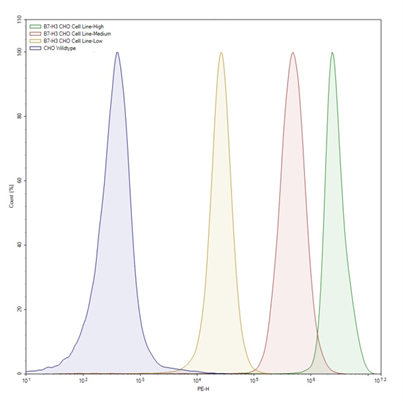B7-H3 CHO Cell Line (High, Medium, or Low Expression)
B7 homolog 3 protein (B7-H3) CHO Cell line is a recombinant clonal stable CHO cell line expressing full length human B7-H3 protein, also known as cluster of differentiation 276 (CD276, B7H3; B7RP-2; 4Ig-B7-H3). Surface expression of B7-H3 was confirmed by flow cytometry. Each stable clonal cell line was selected for High, Medium, or Low levels of B7-H3 expression to mimic different B7-H3 expression levels in various cancer types.
Purchase of this cell line is for research purposes only; commercial use requires a separate license. View the full terms and conditions.
| Name | Ordering Information |
| Thaw Medium 3 | BPS Bioscience #60186 |
| Growth Medium 3B | BPS Bioscience #79529 |
The cell line has been screened to confirm the absence of Mycoplasma species.
B7-H3 belongs to the B7 family, a group of structurally related cell surface protein ligands that bind to CD28 receptors on lymphocytes to regulate immune response. It is overexpressed in many cancers, acting as a negative regulator of T cell immune responses, thereby aiding in immune evasion. Its expression is associated with poor outcomes and survival times in patients. Through various studies, B7-H3 has been linked to other functions associated with tumor progression, such as angiogenesis, metastasis, and exosomal activity. B7-H3 can also be released in soluble form (sB7-H3) into the tumor microenvironment, where it has been implicated in increased migration and invasion of cancer cells. Due to its relative absence in normal tissues and its multifaceted effects on tumor cells, B7-H3 is an attractive target for immunotherapy treatments.


